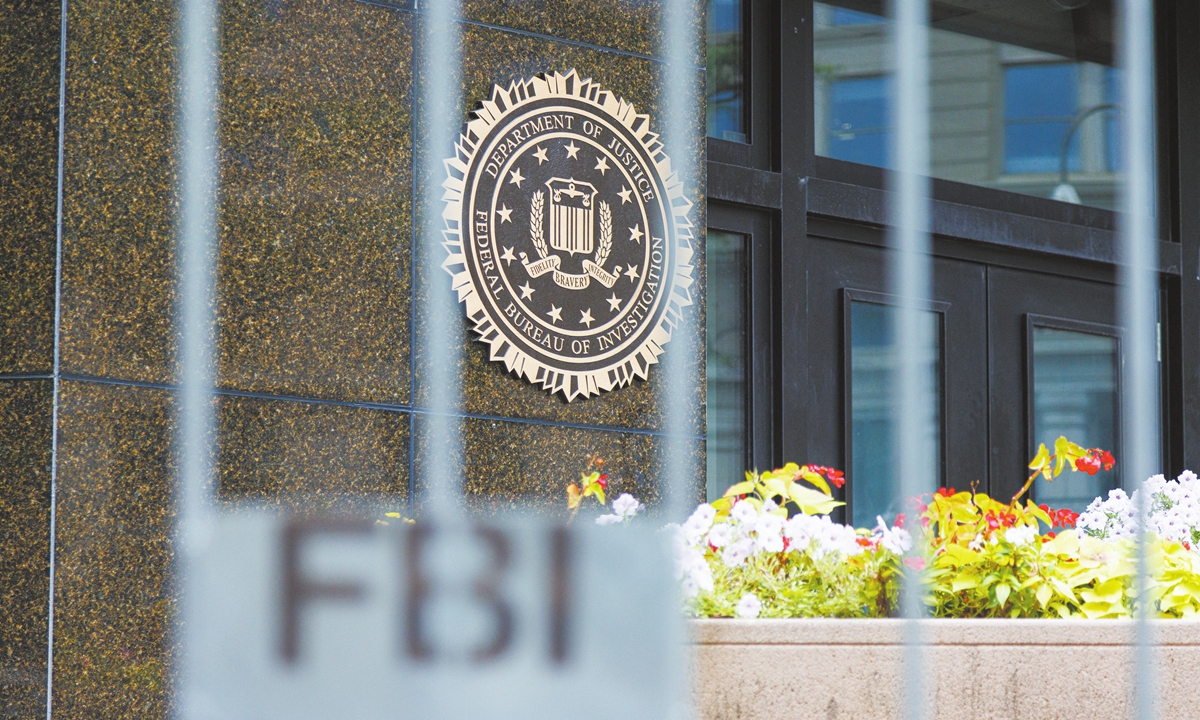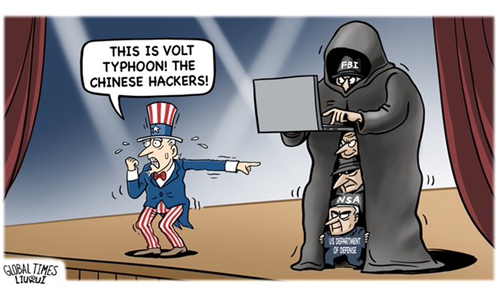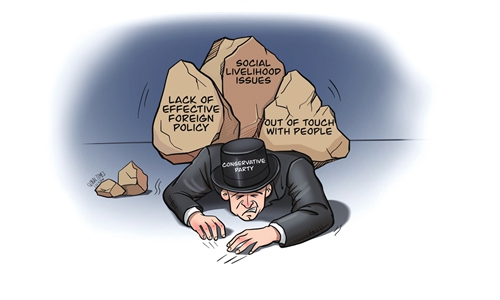
The seal of the FBI is seen on a wall at FBI Headquarters beyond new security fencing in Washington, DC on August 14, 2022. Photo: AFP
Former UN weapons inspector Scott Ritter (Ritter)'s home in New York was raided by the FBI as part of a federal investigation on August 7 over allegations he is an unregistered foreign agent. Ritter, also a former US Marine Corps intelligence officer, has been a critic of US foreign policy, particularly regarding US policy in the ongoing Russia-Ukraine conflict. In an interview with Global Times (GT) reporter Wang Wenwen on her I-Talk show, Ritter said he will not be discredited or intimidated.
GT: Why do you think the FBI raided your home? In June, US authorities took you off a plane destined for Russia and seized your passport. Are the two events connected?
Ritter: I believe that the two events are connected. One of the justifications that could be used to seize my passport is an ongoing federal investigation. It's clear that the FBI acknowledged that this investigation has been going on for some time. Concerns about me relate to the Foreign Agents Registration Act (FARA), in particular, that I've been taking direction from the Russian government in the conduct of my work. This is part and parcel of a larger investigation.
I'm very unhappy about this, because I know who I am. I know what I've done. And I know I've committed no crimes. I also know that I'm not operating in violation of the FARA. But I try to put myself in the shoes of those people who believe it might be the case.
Their theory is that I'm somehow colluding with or operating at the direction of the Russian government, but they don't have direct evidence of this. All they have is the fact that I write things that appear to be pro-Russian. They're not. They're pro-American.
When I write things, it's because I think that the government of the US is engaged in activities that are harmful to America and that it's important to point it out. But that's their interpretation.
GT: How will such a high-profile raid have an impact on you?
Ritter: As I told the FBI during the raid, regardless of their motives, this raid done in public has a chilling effect. Normally, when they don't have proof, the Department of Justice, which is FARA's enforcement unit, sends a letter of inquiry. It's a polite letter. They say, "Hey, you're doing things. And we think they constitute violations of the FARA, and we think you need to register." And then you have an opportunity upon receiving that to say, "You're right, I will register," or "I disagree." And then you take it to civil litigation.
But they chose not to do that. And you have to ask yourself the question, why? Why would they choose this violent approach? Even though I'm not dead, my house isn't destroyed, it's violent to have 40 people who are not invited into your house to tear it upside down, looking for things that don't exist.
Why did they choose this? And why did they do it in such a public way? I think it's designed to discredit me, intimidate me and silence me. But you can't discredit me because I've done nothing wrong. I'm a former Marine, so I don't get intimidated. And I'm not going to be silenced on issues that I feel strongly about, especially issues that I believe impact the US as a whole.
GT: You are a prominent critic of the US foreign policy. Why do you think the US authorities are less and less tolerant of criticism?
Ritter: The FBI agents came to my house, and they said people have concerns about things that you've been writing and things that you've been saying. I said, really? The FBI is coming to me about that, what happened to free speech in America? They said, no, we believe in free speech, we support free speech, just not yours, because we think your free speech violates the FARA, and that's when they gave me the search warrant.
I guess I should be somewhat proud of the fact that they've singled me out. It means that my voice is being heard, that my voice is having an impact. And it's being heard and having an impact at a time when US policy is falling apart because of the very things that I've said about.
I continue to highlight the fact that the policy that the US government has undertaken in regard to Russia is a policy that leads to a nuclear arms race and the possibility, indeed probability, of a nuclear war that would end life on the planet. That's what motivates me.
I don't want us all to die in a nuclear conflict, especially when that conflict can be avoided because the predicate of the issues that are leading us is premised on lies, distortions and misunderstandings. The fact that somebody in the Department of Justice, somebody in the State Department, somebody in the White House sees fit to silence me only means that I'm doing a good job.
GT: Do you think the US can sustain its thirst for hegemony through wars anymore?
Ritter: Today, the military-industrial complex controls the US. So unless something can be done to break this control, American hegemony will continue to be premised upon the need for American weapons to confront threats that are defined by America.
GT: What would be the worst-case scenario for you?
Ritter: It would be a travesty of constitutional justice if the US government were to succeed in making a case out of nothing. But they've done it before, I mean Julian Assange and others.
The worst-case scenario is that they were able to convince a grand jury that they did have a case, and then they would indict me and then I would have to go to trial. I would like to believe at trial, I could convince a jury of my peers that the US government was wrong, that their case has no merit, and subsequently emerge victorious from that.
If I don't, then the US government could decide on a sentence and then there would be prison time, and this would be devastating for me, my family, and my friends. So that's the worst possible case.
I don't think we're going to get there. I don't think the US government believes that it can successfully prosecute me.
GT: What's your plan for the near future?
Ritter: I continue to do what I do. I have not been charged with any crime, so I live my life, as I always live my life. Eventually, I'd like to get my passport back so that I can resume my travels, but I don't think that's going to happen until this issue is resolved.
I would hope that this particular issue gets resolved very quickly. They have my computers, and they have my phones. They know that their theories are bankrupt.
So, the ball is in the government's court, the ball is in the FBI's court, the Department of Justice's court. Let's see how long. If this is about harassing me, then they'll drag this thing on forever. If this is about justice, this should wrap up fairly certain soon.
Xiao Bowen contributed to this article



